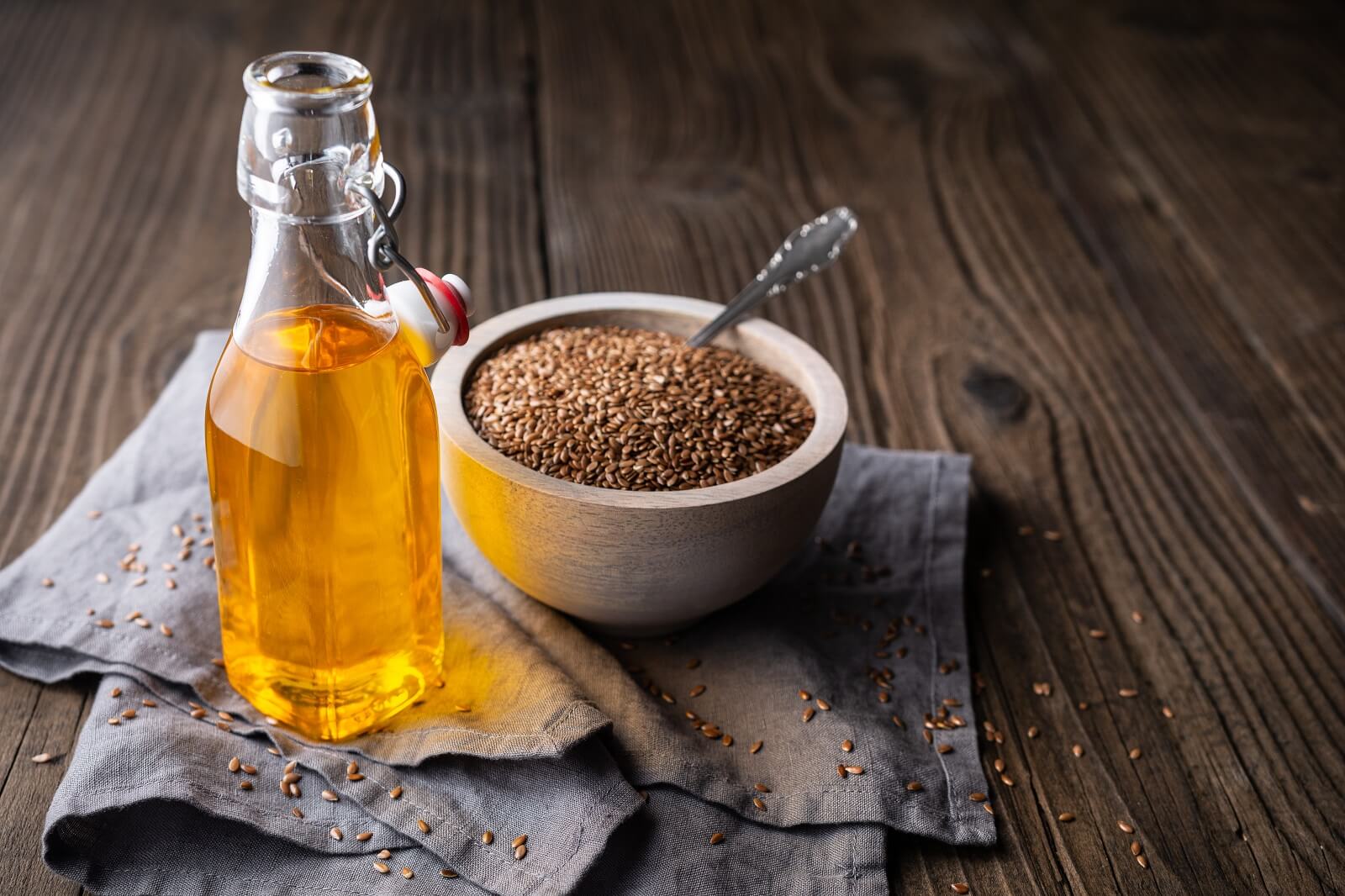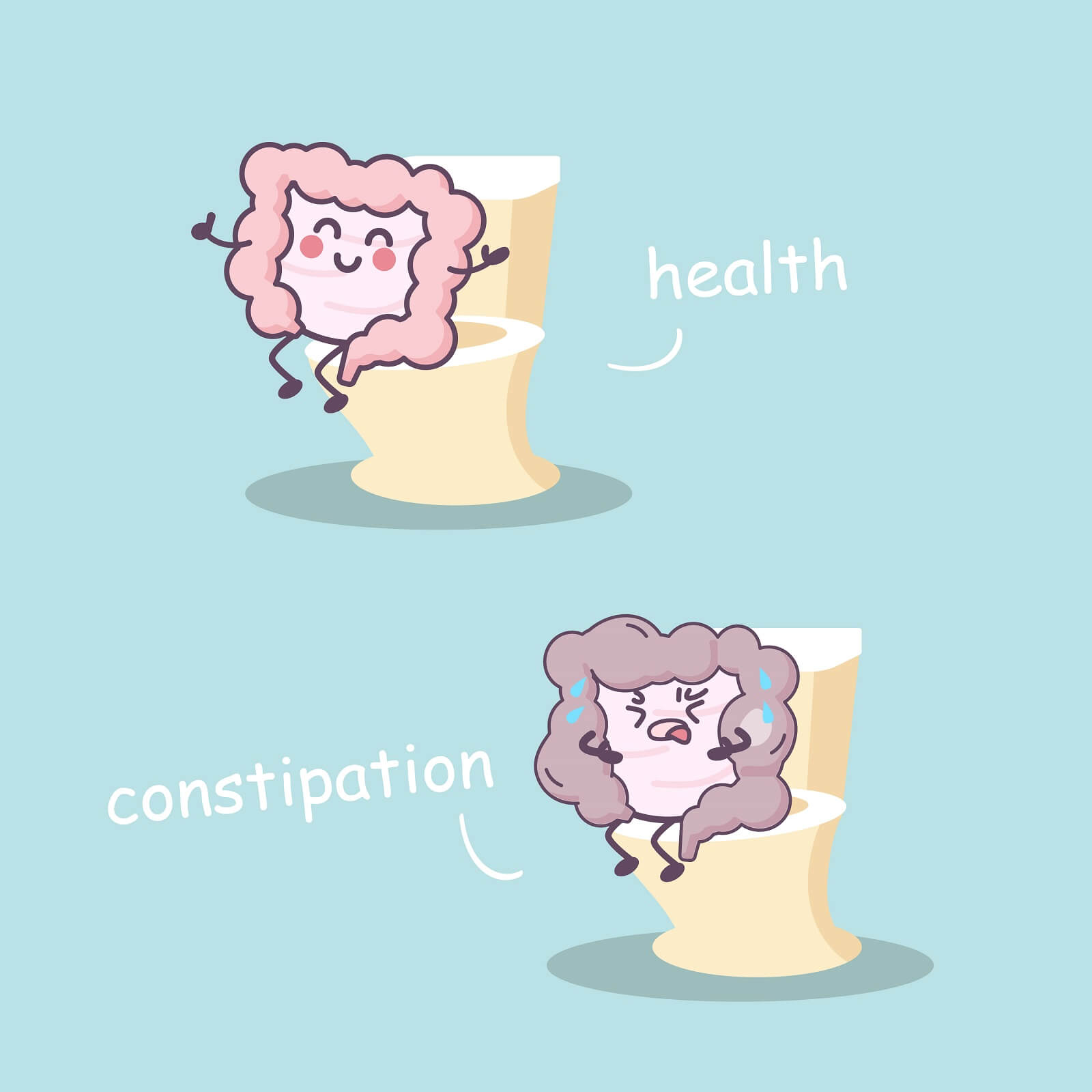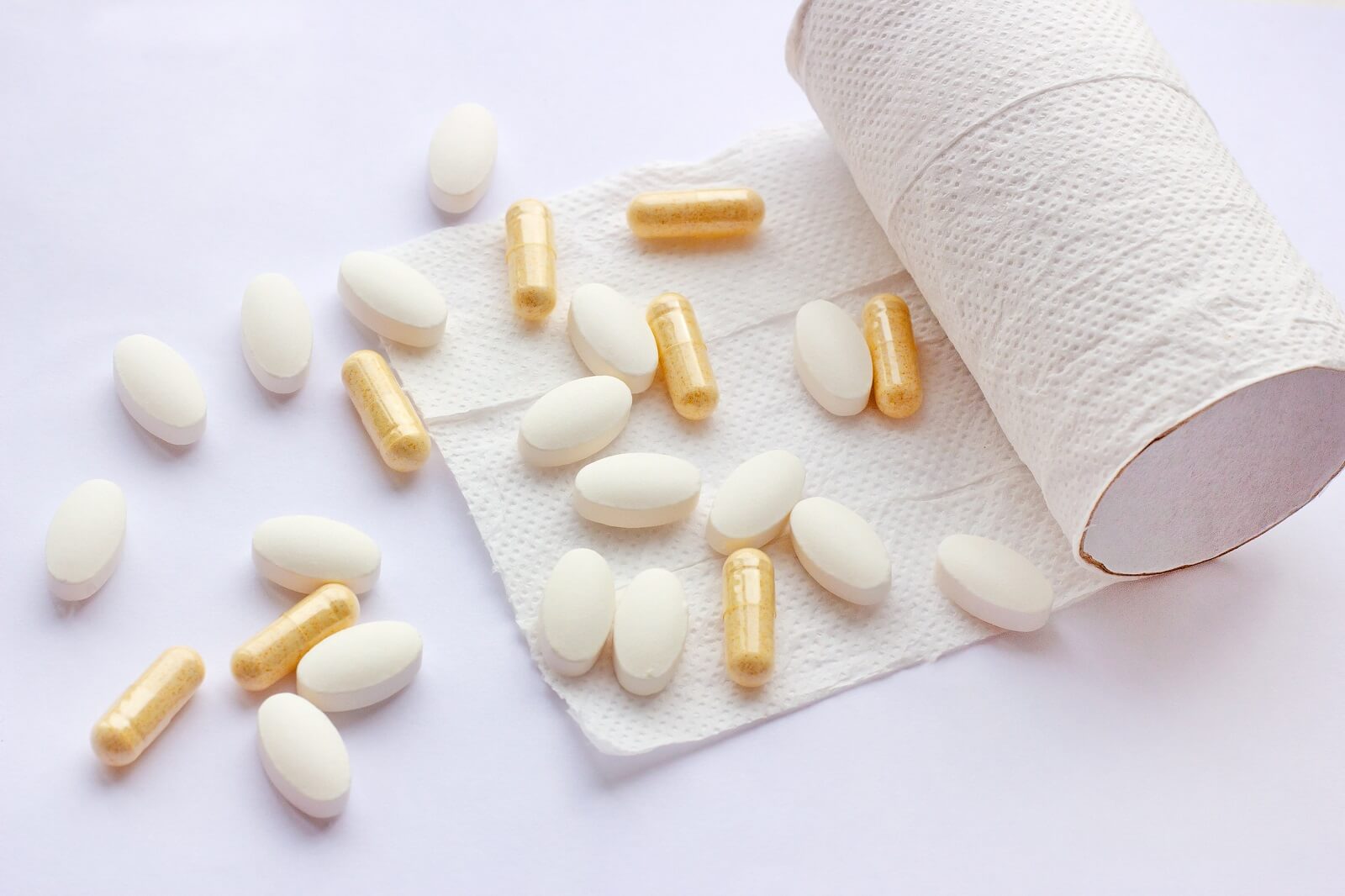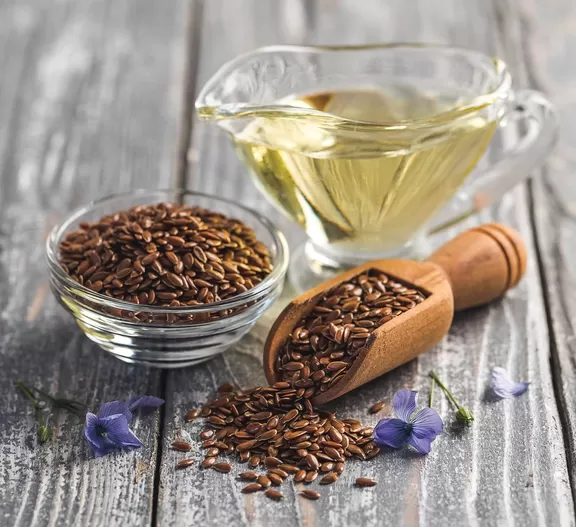
Flax (Linum usitatissimum) is an herb that produces seeds (i.e., flaxseed) that are consumed as a constipation remedy. And, yes, flaxseed does help with constipation and is a natural laxative that helps you poop. In this article we will be discussing many studies that prove flaxseed works as a constipation treatment.
Flaxseed is full of fiber; 50 g of flaxseed flour will contain about 13.3 g of dietary fiber. The fiber content and bulk this herb contributes to the stool makes it a bulk laxative. In addition to fiber and bulk, flaxseed exerts a chemical mechanism on the intestines to help you poop. Lastly, it appears this herb may also be able to improve the presence of probiotic bacteria in the gut as well.
For these reasons, flaxseed is an important natural remedy for constipation that makes a safe laxative. We will discuss why this herb helps you poop in more detail later on; along with a lot of other research validating the information in this initial overview.
But, the important caveat is that getting too much flaxseed may negate the laxative. It appears the oil in flaxseeds begins to have a laxative effect as the dose increases; yet, when the dose becomes too high, this laxative effect stops. Research we will discuss on this phenomena may have indicated that too much flaxseed oil actually reduces intestinal smooth muscle contractions; resulting in slower intestinal transit.
If you take a lot of flaxseed, and do not get enough water, the combination of the possible relaxing of intestinal smooth muscles with the heavy bulk of flaxseed can cause constipation.
So the important thing to remember when you want help having a bowel movement is to take a regular dose of flaxseed; don’t over do it; and, get plenty of water!
How to Use Flaxseed for Treating Constipation
It seems the common dose of flaxseed is a powdered form given at a dose of 50 g per day. And, it appears many studies have participants take this dose for several weeks; therefore it may require some time before chronic constipation is improved with this herb.
A 2022 study in the Journal of Multidisciplinary Healthcare(source 8) suggested mixing this powder in a hot liquid to help take the powder. This study also suggested mixing the powder with typical food as a viable option for getting the proper daily amount. To avoid discomfort, it was suggested to avoid taking a large amount of the powder on an empty stomach; and, to try and to split up the daily dose into 2 or 3 doses.
The late Dr. James Duke, in his book The Green Pharmacy,(source 1) recommends using flaxseed for constipation, and also says Germany’s Commission E (The German equivalent to the US’s FDA) endorse flaxseed for constipation as well. Dr. Duke suggests taking 1 to 3 tablespoons of whole or crushed flaxseed two or three times a day if you have chronic constipation.
It should be noted Dr. Duke also cautions people who take flaxseed to drink plenty of water, at least 8 full glasses a day, to keep all the bulk this herb brings moving through the digestive system!
Samuel Bart’s Digestive Health Solution
Samuel Bart has always been passionate about plants and their ability to keep us healthy. He has put together some of the best natural ways that could help anyone support a healthy digestive system.
Samuel perfected an easy, yet powerful formula, which consists of amazing ingredients. Bart’s supplement is backed by a ironclad 60-day, money back guarantee.

Evidence Flaxseed Makes you Poop (is a Laxative)

A 2015 study in the Journal of Ethnopharmacology(source 2) seemed to explain the laxative effect of flaxseed quite well. Flaxseed, although high in fiber, appears to help you poop by being more than just a bulk laxative.
The basics of the study involved giving mice flaxseed oil (30 mg, 70 mg, or 100 mg / kg of body weight orally) or mucilage (1 g or 2.5 g / kg of body weight orally). The study also conducted in vitro (in a test environment that does not involve a living subject) tests on segments of rabbit and guinea-pig intestines.
To test the laxative effect a scoring system was used where a score of 1 indicated a soft but formed stool and a score of 3 indicated a diarrheal stool (which was the highest score).
It is assumed the scores were added up for each mouse to arrive at the final total value. The following scores were found for the various doses of flaxseed (scores are stated as averages):
Laxative Scores For Flaxseed Oil:
- No flaxseed oil, just delivery vehicle: 1.33
- 30 mg / kg: 14.0
- 70 mg / kg: 23.22
- 100 mg / kg: 1.66
Laxative Scores For Flaxseed Mucilage:
- No mucilage, just delivery vehicle: 1.33
- 1 g / kg: 16.33
- 2.5 g / kg: 27.66
The study confirmed that the laxative effect of flaxseed mucilage and oil was also due to a chemical action, primarily due to activating muscarinic receptors. Muscarinic receptors are protein receptors involved in the parasympathetic nervous system(source 3) (system that relaxes your body after stress, and controls body functions when you are at rest); except for sweat glands, which have these receptors but are part of the sympathetic nervous system (handels the "flight or fight" response).
The study also addressed the fact that high doses of flaxseed oil did not produce any laxative effect. It seems like this may have been due to the fact that excessive amounts of this oil decrease intracellular free calcium ions (due to an efflux of potassium ions) which results in smooth muscle relaxation; hence, the smooth muscles of the intestine reduce their contracting.
To further explain, contraction of the gastrointestinal smooth muscles is mainly regulated by intracellular calcium ion signaling. When the amount of calcium in a cell is elevated, say by calcium ion influx from outside the cell, the end result is contraction.(source 4)
Thus, if calcium ions are leaving the cells, this will result in less smooth muscle contraction; which hinders the movement of material through the intestines.
Simply put, the study seems to suggest that too much flaxseed oil causes intestinal smooth muscle relaxation.
Another study, published in 2012 in BMC Complementary and Alternative Medicine,(source 5) looked at flaxseed and analyzed its laxative effect. This study used partially defatted flaxseed meal (PDFM) and studied its effects on healthy and constipated mice.
The mice were given three different doses of PDFM: 2.5%, 5% and 10% (weight / weight) for 14 days. The low dose was labeled L-PDFM, the medium M-PDFM, and the high H-PDFM.
The study found that the time to the first bowel movement for healthy mice who took PDFM was sooner than the control mice who did not have PDFM; and, this difference was statistically significant.
The amount of defecation (bowel movements) was greater and so was the weight of the feces for healthy mice taking PDFM.
The charts below show the aforementioned findings graphically.

Groups sharing different letters above the bars mean statistically significant differences (P < 0.05), while those denoted by any same letters are insignificant.
Image Source: DOI 10.1186/1472-6882-12-14. Used Under a Creative Commons CC BY 2.0 License.
For constipated mice, PDFM reversed the effects of prolonged intestinal transit time due to constipation induced with a chemical called atropine-diphenoxylate (The test results for mice just given atropine-diphenoxylate are labeled in the following graph as "AD"). PDFM brought the intestinal transit time down to levels similar to that of mice who were not given the constipating chemical or PDFM.
The constipated mice had a noticeable decline in the amount of defecation and wet weight of feces. Constipated mice in the M-PDFM and H-PDFM had significantly more defecation and higher wet feces weight than constipated mice who did not get PDFM.
The charts below show the aforementioned findings graphically.

Groups sharing different letters above the bars mean statistically significant differences (P < 0.05), while those denoted by any same letters are insignificant.
Image Source: DOI 10.1186/1472-6882-12-14. Used Under a Creative Commons CC BY 2.0 License.
The study concluded with the following statement:
In conclusion, the present results indicate that PDFM has the ability to promote intestinal motility, stimulate intestinal transit as well as increase stool frequency and weight. These results suggest that PDFM may be a useful laxative to facilitate fecal output in normal and constipation conditions.
BMC Complementary and Alternative Medicine [12 (2012): 14]
Guaranteed 24 Hour Constipation Relief
Dr. Scott McLeod, PharmD received his doctorate from the WSU College of Pharmacy. His book on constipation is guaranteed to show you how to get relief in 24 hours or less-or your money back (60 day, 100% refund guarantee).
Everything used in this plan is from nature. No use of harmful laxatives. People who have used these say they work BETTER than over-the-counter laxatives!

Evidence Flaxseed Relieves Constipation

A 2019 study in Clinical nutrition ESPEN(source 6) analyzed if flaxseed could improve constipation. The study was conducted to see how flaxseed and psyllium would individually affect 77 constipated patients who had type 2 diabetes.
To conduct this test, participants were given cookies containing either 10 g of flaxseed, 10 g psyllium, or just plain cookies (serving as the control group). The study participants were evaluated at the beginning and end of weeks 4, 8, and 12 weeks.
Participants receiving the flaxseed reported a greater improvement in constipation symptoms than those who took psyllium. Both the flaxseed and psyllium treatments appeared to decrease constipation symptoms.
The study came to the following conclusion: Although both flaxseed and psyllium may decrease constipation symptoms, weight, glycemic and lipid levels, treatment with flaxseed [appears] to be superior to psyllium.
A 2020 study in the Asia Pacific Journal of Clinical Nutrition(source 7) looked at how flaxseed flour could improve constipation compared to the common constipation treatment of lactulose (a type of sugar that the human body cannot absorb which is used to treat constipation). The study encompassed 90 participants who all had constipation.
The participants either took 50 g of flaxseed flour (which contains 13.3 g of dietary fiber) or 15 mL of lactulose orally on an empty stomach. The participants took their assigned treatment for 4 weeks.
Of those participants who took flaxseed, 78.3% of them reported having a hard stool consistency; 21.7% of this group reported a normal stool consistency. After 4 weeks of taking the flaxseed flour 86.7% of people in this group reported a normal stool consistency, 10% reported having watery stools, and only 3.3% still had hard stool consistency.
Concerning overall constipation symptom scores, those taking the flaxseed flour reported an improvement of 7 points from baseline (the start of the study). Those taking lactulose improved by 5 points from baseline.
The study concluded that flaxseed flour produced a significant increase in bowel movement frequency; and, this was more than what lactulose did.
A 2022 study in the Journal of Multidisciplinary Healthcare(source 8) looked at how flaxseed powder would influence patients with chronic constipation; and, how this herb would modify the gut microbiota (the bacteria and other microscopic life in the gut).
The study reports that flaxseed has fibers that can improve the movement of material through the gut (i.e., motility) and decrease the time before you pass a stool. Additionally, the study says it has been reported that flaxseed can significantly change gut microbiota in healthy adults after eating flax seeds for a week; hence, the further investigation by this study.
The study involved 60 participants (54 males and 6 females) with an average age close to 68 years. The participants were treated with a daily dose of 50 g flaxseed powder for 4 weeks.
The study found that the flaxseed treatment helped increase frequency of bowel movements along with improving anxiety, anorexia, and abdominal distension. Taking this herb also reduced the participants dependency on laxatives.
The efficacy of flaxseed was evaluated as noticeably effective for 27 (45.0%), effective for 26 (43.3%), and ineffective for 7 (11.7%) participants. Additionally, 60% of participants had hard stools before treatment, and only 3.33% had hard stools after treatment. The percentage of those with normal stools went from 30% before treatment to 86.6% after treatment.
Concerning the microbiota, the diversity of bacterial clusters significantly increased after flaxseed treatment. Healthy subjects serving as controls had more Blautia bacteria at the start of the study than did those with chronic constipation. And, Blautia obeum increased significantly after flax seed treatment; and this bacteria might be the main reason for the therapeutic effect of flaxseed.
The study concluded with the following remarks:
Flax seeds may improve the defecation in elderly patients with chronic constipation and change intestinal microecological structure. Thus, flax seeds may serve as an effective diet supplement in the management of chronic constipation.
Journal of Multidisciplinary Healthcare [(2022): 2407-2418]
Naturally Treat Hemorrhoids in 48 Hours
Jessica Wright’s unique 5-step, all-natural approach to hemorrhoid treatment delivers permanent relief. Heal hemorrhoids in 48 hours, and eliminate the root cause in 30 to 60 days.
Benefit from Jessica’s 12 years of research; her book is backed by a 60 day, 100% money back guarantee.

How Flaxseed Oil Helps with Constipation
A 2015 study in the Journal of Renal Nutrition(source 9) conducted a study that involved seeing how flaxseed oil could help with constipated individuals. The study used 50 participants that were undergoing dialysis that also had constipation.
The study used three different oils as treatment for the participants: flaxseed oil, olive oil, and mineral oil. Participants took one of these oils for 4 weeks at an initial dose of 4 mL per day; but, an additional 2 mL could be added.
At week 4 of the study, those participants taking olive oil reported the lowest presence of constipation symptoms, followed by mineral oil; lastly, symptom improvement for flaxseed oil occurred but less than the other two oils.
The study found that 5 of 6 constipation symptoms improved with olive oil and mineral oil; but, only frequency of evacuation and consistency of stools improved in the flaxseed oil group.
Overall the study concluded that daily use of all three oils were effective treatments for constipation in the tested participants.
Dr. John Herzog (MD)
Dr. John Herzog, a "survival surgeon" from Maine explains what home remedies work best in a crisis situation.
This may be important in the event you require first-aid or are in an emergency situation without easy access to a hospital. Dr. John Herzog has assembled a large collection of home remedies for such scenarios.

Flaxseed Side Effects & Guidelines
Flaxseed is generally safe, but there are some side effects to be aware of. The mucilage in it might interfere with the absorption of medications. And, you may want to limit small children’s intake of it because it does result in a little cyanide being put into the body due to the presence of cyanogenic glycosides (these chemicals are found in other plants and are not that unusual).
Aside from the possibility of constipation if you do not drink enough water when you take it, it is probably unlikely that adults will have problems if they consume reasonable amounts.
But, Herbsey does have an entire article on the side effects of flaxseed, which goes into greater detail. If you’d like to learn more, and get a fuller understanding about this helpful food, you can check it out:
Claire Goodall’s Amazing Guide
Clair Goodall is a bee-obsessed, natural medicine convert from Minnesota (USA). And, she does keep bees!
Clair has created 350+ page book documenting how to replace the toxic products and medications in your home with healthier, all-natural alternatives.

A Natural Digestive System Supplement that Helps

If you have been struggling with digestive problems like constipation, you should know about Samuel Bart. Mr. Bart lives with his wife, Alma, in Nashville, Tennessee.
Mr. Bart has always had a passion for plants and how to use them medicinally. He went on to research some of the most effective ways that could help people support a healthy digestive system.
To this end, Mr. Bart developed a product he calls “SynoGut.”
Every capsule of this supplement is made in the USA, in a FDA approved, and GMP certified, facility under sterile, strict, and precise standards. Synogut capsules are non-GMO. You can rest assured that they do not contain any dangerous stimulants or toxins, and more importantly, they are not habit forming.
His proprietary blend blend contains the following ingredients:
- Psyllium husk
- Bentonite clay
- Black walnut hull
- Oat bran
- Flaxseed
- Prune fruit
- Aloe vera leaf
- Lactobacillus acidophilus (a probiotic bacteria)
- Apple fruit pectin
- Glucomannan root
If this is not the first time you have had constipation, you might benefit from the power these natural items can provide. And, if you have had prolonged constipation, utilizing a supplement like Mr. Bart’s could help you become more regular—without an arsenal of prescription drugs.
Many people have tried synthetic drugs to solve their constipation issues; and if these didn’t work, it may be hard to invest in a natural remedy like SynoGut. To this end, Mr. Bart offers a 60 day, full refund guarantee on his supplement.
If you decide to invest in Mr. Bart’s supplement, and are not satisfied with the results, you can quickly request a refund. SynoGut will promptly refund your purchase; ensuring there is no risk to give Mr. Bart a chance.
SynoGut is sold via the large online retailer ClickBank—a company based in Boise Idaho, USA. ClickBank sells products across the world, and ensures you can get a refund if you are not satisfied with SynoGut’s results.
If you are in a situation where you have “tried everything,” SynoGut is worth the quick purchase and a solid test drive. If you would like to learn more about Samuel Bart’s SynoGut supplement, you can do so at the SynoGut website.
About the Author
Geoff Kent is a natural medicine enthusiast who has been researching and writing about natural medicine since 2008. Geoff is primarily a web developer, but also researches and authors written and video content about natural health. Geoff has a bachelor’s degree in Management Information Systems from the University of Northern Iowa.
More on Geoff KentImportant Disclosures & Disclaimers
It is important to use the information you find on Herbsey.com in the right way. Also for legal reasons, these disclaimers and disclosures are necessary. For further information about each, feel free to click the link provided to the page on this website that provides more information.
Medical Disclaimer
The information on this website is not a prescription for anyone. This information is for informational or educational purposes only, and is not a substitute for professional medical advice or consultations with healthcare professionals.
Advertisement Disclosure
Some of the links provided on this article and website are affiliate links. If you purchase a product after clicking on these links, Herbsey.com will earn a commission. Herbsey.com promotes various products through advertisement and text links. For more information: Our Advertisements.











